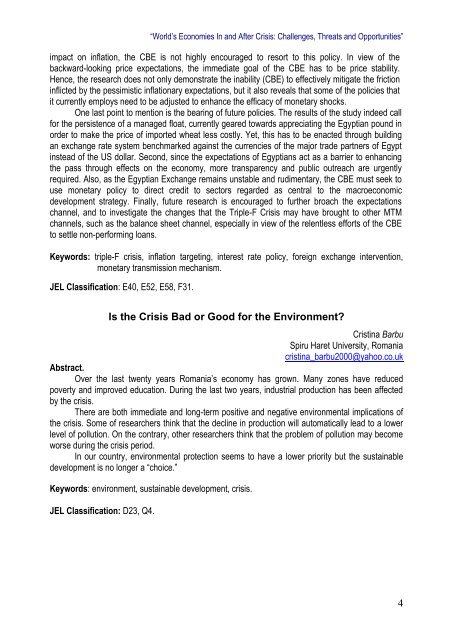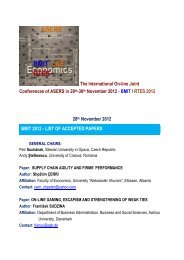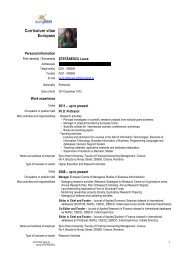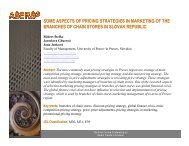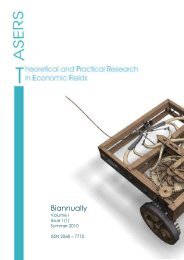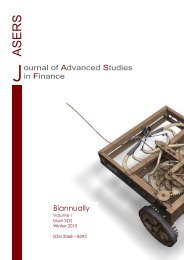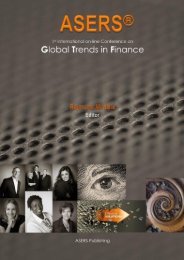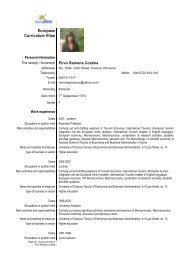eBook of Abstracts - ASERS
eBook of Abstracts - ASERS
eBook of Abstracts - ASERS
You also want an ePaper? Increase the reach of your titles
YUMPU automatically turns print PDFs into web optimized ePapers that Google loves.
“World’s Economies In and After Crisis: Challenges, Threats and Opportunities”<br />
impact on inflation, the CBE is not highly encouraged to resort to this policy. In view <strong>of</strong> the<br />
backward-looking price expectations, the immediate goal <strong>of</strong> the CBE has to be price stability.<br />
Hence, the research does not only demonstrate the inability (CBE) to effectively mitigate the friction<br />
inflicted by the pessimistic inflationary expectations, but it also reveals that some <strong>of</strong> the policies that<br />
it currently employs need to be adjusted to enhance the efficacy <strong>of</strong> monetary shocks.<br />
One last point to mention is the bearing <strong>of</strong> future policies. The results <strong>of</strong> the study indeed call<br />
for the persistence <strong>of</strong> a managed float, currently geared towards appreciating the Egyptian pound in<br />
order to make the price <strong>of</strong> imported wheat less costly. Yet, this has to be enacted through building<br />
an exchange rate system benchmarked against the currencies <strong>of</strong> the major trade partners <strong>of</strong> Egypt<br />
instead <strong>of</strong> the US dollar. Second, since the expectations <strong>of</strong> Egyptians act as a barrier to enhancing<br />
the pass through effects on the economy, more transparency and public outreach are urgently<br />
required. Also, as the Egyptian Exchange remains unstable and rudimentary, the CBE must seek to<br />
use monetary policy to direct credit to sectors regarded as central to the macroeconomic<br />
development strategy. Finally, future research is encouraged to further broach the expectations<br />
channel, and to investigate the changes that the Triple-F Crisis may have brought to other MTM<br />
channels, such as the balance sheet channel, especially in view <strong>of</strong> the relentless efforts <strong>of</strong> the CBE<br />
to settle non-performing loans.<br />
Keywords: triple-F crisis, inflation targeting, interest rate policy, foreign exchange intervention,<br />
monetary transmission mechanism.<br />
JEL Classification: E40, E52, E58, F31.<br />
Is the Crisis Bad or Good for the Environment<br />
Cristina Barbu<br />
Spiru Haret University, Romania<br />
cristina_barbu2000@yahoo.co.uk<br />
Abstract.<br />
Over the last twenty years Romania’s economy has grown. Many zones have reduced<br />
poverty and improved education. During the last two years, industrial production has been affected<br />
by the crisis.<br />
There are both immediate and long-term positive and negative environmental implications <strong>of</strong><br />
the crisis. Some <strong>of</strong> researchers think that the decline in production will automatically lead to a lower<br />
level <strong>of</strong> pollution. On the contrary, other researchers think that the problem <strong>of</strong> pollution may become<br />
worse during the crisis period.<br />
In our country, environmental protection seems to have a lower priority but the sustainable<br />
development is no longer a “choice.”<br />
Keywords: environment, sustainable development, crisis.<br />
JEL Classification: D23, Q4.<br />
4


